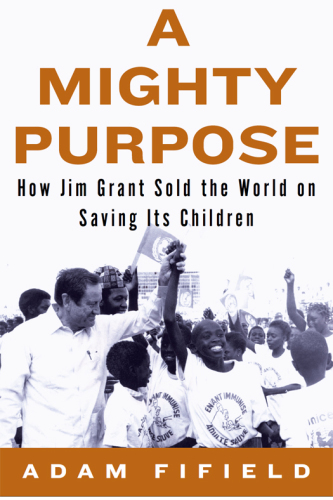
A Mighty Purpose
How Jim Grant Sold the World on Saving Its Children
کتاب های مرتبط
- اطلاعات
- نقد و بررسی
- دیدگاه کاربران
نقد و بررسی

July 1, 2015
A biographical commemoration of a powerful champion of children's health. Under the 15-year directorship of James Grant (1922-1995), the United Nations International Children's Emergency Fund grew into a "propulsive global advocate" for children throughout the world. Fifield (A Blessing over Ashes: The Remarkable Odyssey of My Unlikely Brother, 2000), a journalist who served as deputy director of editorial and creative services at the U.S. Fund for UNICEF, interviewed more than 80 people, including Grant's colleagues and family members, for this richly detailed life of a man who "turned red tape into ribbons," persuaded dictators and tyrants to accede to his requests, and worked obsessively to achieve his goals. Grant, writes the author, "radiated a messianic zeal" fueled by "his undeniable moral urgency." Although some found him insufferable-"an agitator, a pest, an irritant extraordinaire"-they discovered that opposing him "was like wrestling with an angel." Throughout his tenure, Grant worked tirelessly to achieve two goals: to spread the use of oral hydration powder (a simple mixture of sugar and salt) to combat diarrhea, the greatest killer of children in developing countries; and to increase immunization for polio, tetanus, diphtheria, and whooping cough. He had no qualms about negotiating with dictators in Haiti, Sudan, Central America, Syria, and Turkey. "Recruiting despots became a Grant trademark," writes Fifield. "It is much easier to work through a dictatorship" than to deal with committees, Grant found. "Things just get done." Nor did battles, military coups, or natural disasters deter him. During El Salvador's "vicious civil war," Grant brokered "Days of Tranquility," a truce that allowed health workers to carry out immunizations. In 1989, he terrified a Sudanese general into protecting a train carrying food into the starving south. Sadly, liver cancer cut his career short. At his funeral, 2,500 people gathered to honor him; since then, he has been largely forgotten. Fifield ably brings him back into focus. This fine, engrossing portrait reveals Grant's unstoppable passion and remarkable achievements.
COPYRIGHT(2015) Kirkus Reviews, ALL RIGHTS RESERVED.

June 1, 2015
Jim Grant, head of UNICEF for 15 years, challenged global acceptance that children in impoverished nations would die of malnutrition and preventable disease. Nominated by President Carter in 1979, Grant transformed the organization, which had been created by the UN after WWII to help children in postwar Europe and Asia. He tapped into the UN's political and social influence to bring attention to the plight of children in underdeveloped nations and used his mission as a way to bolster the development of poor nations. Fifield recounts Grant's journeys from Cambodia to Somalia, navigating treacherous political landscapes to deliver aid to children and their families. His single-minded devotion and insistence on pushing past bureaucratic red tape was often viewed as recklessness and led to a financial scandal in the UNICEF Kenya office, tarnishing the image of the organization. Admired for his ability to mesmerize politicians, government bureaucrats, warlordsanyone who might stand in the way of his mission to deliver food and medicine to childrenGrant quadrupled childhood immunization rates and is estimated to have saved tens of millions of children.(Reprinted with permission of Booklist, copyright 2015, American Library Association.)

























دیدگاه کاربران